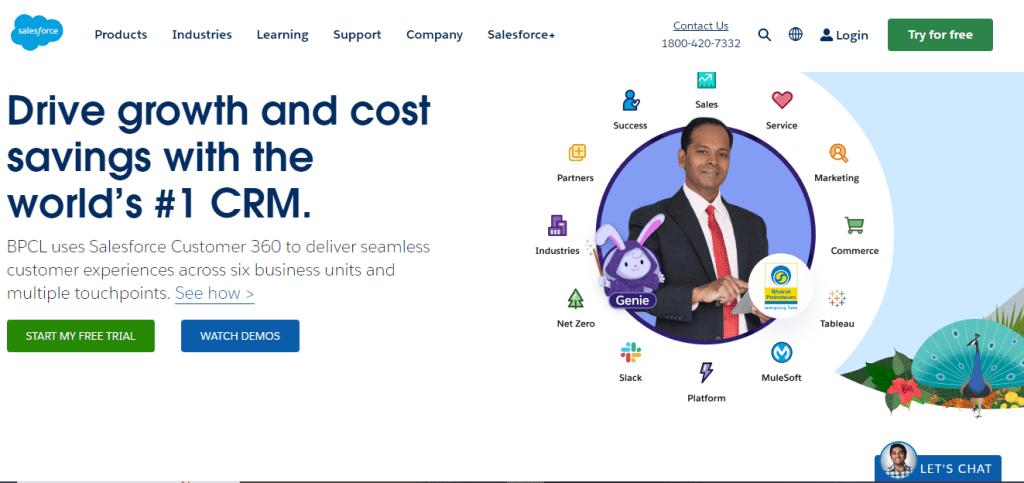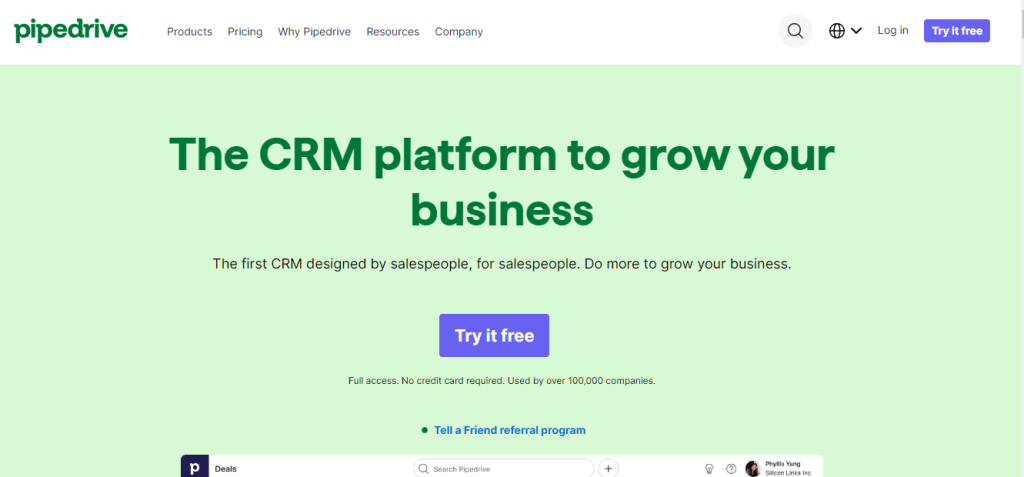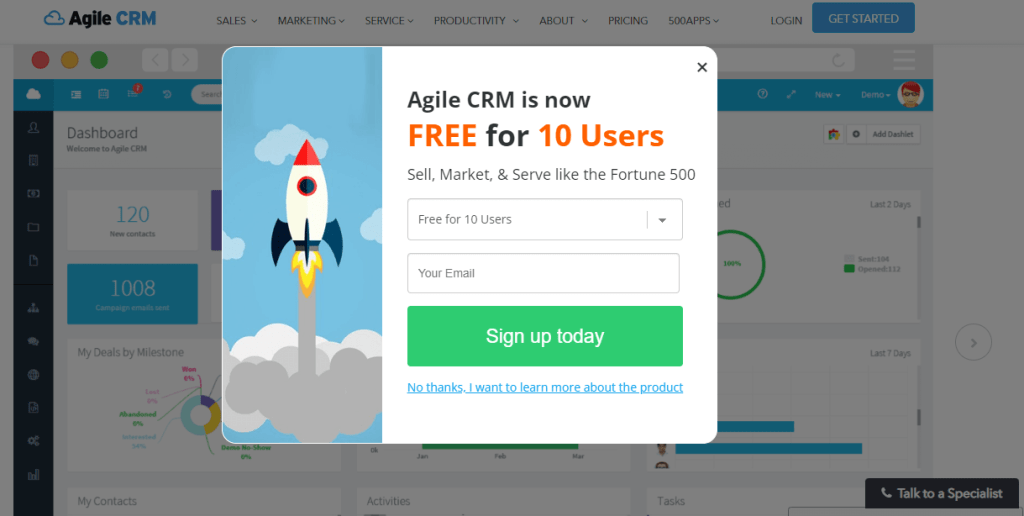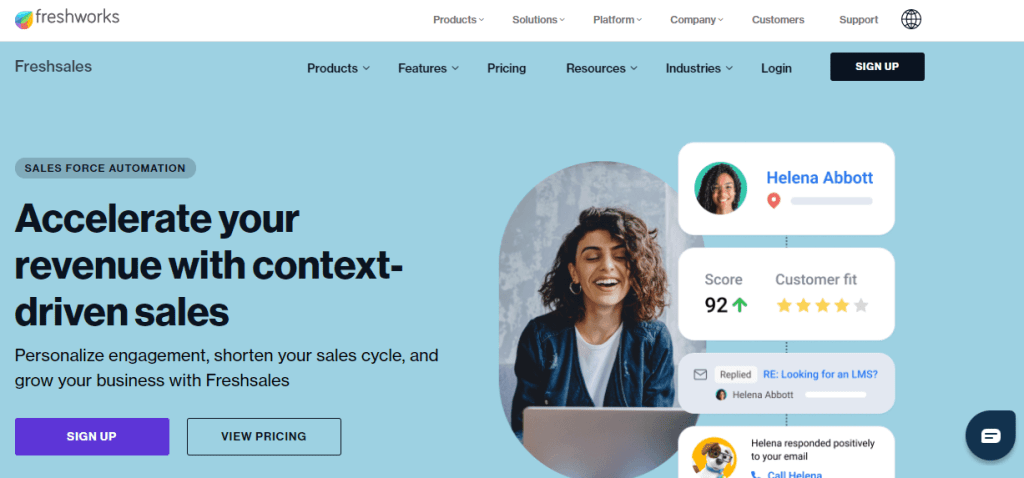Are you in the market for a CRM system but are hesitant about committing to HubSpot CRM? While HubSpot is a popular choice, it may not be the best fit for everyone.
Fortunately, there are several CRM alternatives available that can meet your business’s unique needs.
In this blog post, we will explore the top five alternatives to HubSpot CRM and examine their key features, pros, and cons.
Whether you are a small business owner or a sales manager looking to streamline your processes, this guide will help you choose the best CRM solution for your organization.
So, let’s dive in!
What is HubSpot CRM?
Hubspot CRM is a customer relationship management (CRM) platform designed to help businesses manage their sales pipeline and customer interactions.
It is a cloud-based software that can be accessed from anywhere with an internet connection and offers a range of features to help businesses streamline their sales and marketing efforts.
One of the main features of Hubspot CRM is its contact management system, which allows businesses to store and organize their customer data in one place. This includes contact information, social media profiles, communication history, and other relevant details.
The platform also offers lead scoring and segmentation tools, which help businesses prioritize leads and target their marketing efforts more effectively.
Hubspot CRM also includes a range of sales tools, such as a sales pipeline dashboard, deal tracking, and sales reporting. These tools help businesses track the progress of their sales pipeline and identify areas where they can improve their sales process.
Besides, the platform also integrates with other Hubspot products, such as marketing automation and customer service tools, to provide a more comprehensive suite of services.
What is the Importance of a CRM for a Business?
A CRM is a tool that businesses use to manage their interactions with customers and prospects.
Let’s take a look at some of the key importance of having a CRM for a business:
- Centralized Customer Data Management: It enables businesses to store and manage all customer data in one centralized location, making it easier to access and analyze customer information. This helps businesses understand customer needs and preferences, and develop better products and services.
- Improved Customer Engagement: It enables businesses to track and manage customer interactions across all touchpoints, including email, phone, and social media. This helps businesses provide more personalized and relevant communication to customers, leading to improved engagement and loyalty.
- Enhanced Sales Performance: It can help businesses manage their sales pipelines more effectively by providing real-time visibility into sales activities and forecasting. This helps sales teams prioritize leads and opportunities, resulting in increased sales productivity and revenue.
- Better Marketing ROI: It enables businesses to track the effectiveness of their marketing campaigns, including email campaigns, social media advertising, and other online promotions. This helps businesses identify which campaigns are driving the most engagement and revenue, and adjust their strategies accordingly.
- Improved Collaboration and Communication: It also enables teams to collaborate more effectively by providing real-time access to customer data and activity. This helps teams work together to solve customer issues and improve customer experiences, leading to higher customer satisfaction.
Why Do You Need the Best Alternative to Hubspot CRM?
There are several reasons why someone might be looking for the best alternative to Hubspot CRM:
- Cost: Hubspot CRM can be expensive for some businesses, especially for those that are just starting out or have a limited budget.
- Ease of use: Some users may find Hubspot CRM to be too complex or difficult to navigate, and they may prefer a simpler alternative that is easier to use.
- Features: While Hubspot CRM has many features, some businesses may require specific features that are not available in the platform, such as integration with certain software or customizations.
- Support: It provides support, but some users may require more personalized or responsive customer support than what is offered.
- Data ownership: Some businesses may want to have complete control over their data, including the ability to export it easily, and they may prefer an alternative CRM that offers more flexibility in this regard.
5 Best Alternative to Hubspot CRM
There are several CRM options available that can serve as alternatives to HubSpot CRM. Now we’ll share 5 best HubSpot alternatives that you can use to take your business to the next level.
1. Salesforce CRM
Salesforce is one of the most popular CRM solutions on the market, and for good reason. It offers a wide range of features and customization options, making it a great choice for businesses of all sizes.

Key Features
- Lead and opportunity management
- Sales forecasting and reporting
- Marketing automation
- Customizable dashboards and reports
- Mobile app for iOS and Android
Pros
- Extremely customizable and scalable
- Wide range of features
- Integrates well with other tools and platforms
- Active community and support resources
Cons
- Expensive, especially for small businesses
- Steep learning curve
- Requires technical expertise for customization
- Some features require additional add-ons or third-party integrations
2. Zoho CRM
Zoho is a comprehensive CRM platform that offers a range of features, including lead management, sales forecasting, and marketing automation. It also offers a free plan for small businesses.

Key Features
- Lead and contact management
- Sales forecasting and reporting
- Marketing automation
- Social media integration
- Mobile app for iOS and Android
Pros
- Affordable, with a free plan for up to 3 users
- Easy to set up and use
- Comprehensive features and customization options
- Integrates well with other Zoho tools and third-party platforms
Cons
- Some advanced features require higher-tier plans
- Limited customization options for certain features
- Support can be slow to respond
3. Pipedrive
Pipedrive is a simple and intuitive CRM platform that focuses on sales pipeline management. It offers a visual interface that helps users keep track of their deals and progress.

Key Features
- Sales pipeline management
- Lead and deal tracking
- Sales reporting and forecasting
- Email integration
- Mobile app for iOS and Android
Pros
- Intuitive and user-friendly interface
- Focus on sales pipeline management is helpful for sales teams
- Wide range of integrations with third-party tools
- Affordable pricing for small businesses
Cons
- Limited marketing automation features
- Some customization options can be difficult to find
- Reporting features are not as robust as some other CRMs
4. Agile CRM
Agile CRM is a powerful and affordable CRM solution that offers features such as contact management, sales automation, and marketing automation. It also offers a free plan for up to 10 users.

Key Features
- Contact and lead management
- Sales and marketing automation
- Email tracking and analytics
- Appointment scheduling
- Mobile app for iOS and Android
Pros
- Comprehensive features, including marketing automation
- Affordable pricing, with a free plan for up to 10 users
- Integration with third-party platforms and tools
- User-friendly interface
Cons
- Limited reporting and analytics features
- Some users may find the interface cluttered or overwhelming
- Limited customization options for certain features
5. Freshsales
Freshsales is a cloud-based CRM solution that offers features such as lead scoring, sales forecasting, and email tracking. It also offers a free plan for small businesses with basic CRM needs.

Key Features
- Lead and contact management
- Sales forecasting and reporting
- Email and phone integration
- AI-powered lead scoring
- Mobile app for iOS and Android
Pros
- Intuitive and user-friendly interface
- Robust sales forecasting and reporting features
- AI-powered lead scoring is helpful for sales teams
- Affordable pricing, with a free plan for up to 2 users
Cons
- Limited marketing automation features
- Some customization options can be difficult to find
- Some users may find the interface too simplistic
Summary
There are several CRM alternatives available that can meet your business’s unique needs, regardless of whether or not HubSpot CRM is the right fit for you.
From Salesforce and Zoho CRM to Pipedrive, Agile CRM, and Freshsales, each of these CRMs has its own unique features, pros, and cons.
By comparing these top five alternatives, you can make an informed decision about which CRM solution is best for your organization. We hope this guide has been helpful in your search for the right CRM system.
Remember, choosing the right CRM can help you centralize your customer data, improve customer engagement, enhance sales performance, achieve better marketing ROI, and foster greater collaboration and communication across teams.
Ultimately, the right CRM solution can help you build stronger relationships with your customers, grow your business, and achieve your goals.





